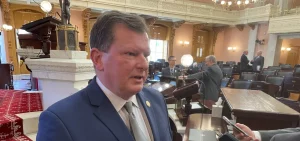News
Ohio lawmakers might not meet the June 30 deadline for a new two-year state budget
By: Jo Ingles | Statehouse News Bureau
Posted on:
COLUMBUS, Ohio (Statehouse News Bureau) — The Ohio House Speaker is warning that negotiations on the state’s biennnial budget could go into July, causing legislators to miss their deadline to pass a budget bill.

All of these differences are going to be coming into play now as the House and Senate hammer out details, often behind closed doors, as the budget makes its way through a conference committee.
The House budget provided more money for food banks, childcare, K-12 schools and social services. It passed with widespread bipartisan support.
The Senate budget offered larger tax cuts by consolidating the three tax brackets in the House budget into two, and it expanded taxpayer-paid vouchers for private schools well beyond what the House allowed. Republican Senators also cut the House’s social services spending. No Democrats voted for the Senate budget.
As the House and Senate come together to resolve their differences in conference committee later this week, Speaker Jason Stephens (D-Kitts Hill) said House members want to make sure this budget serves all Ohioans.
“We profess to be pro-life. We profess to care about children and care about those who can’t take care of themselves. I think we need to put our money where our mouth is when it comes to the state budget,” Stephens said. “And I think that is extremely important because it affects thousands, if not millions, of people across Ohio, and we are ready to have that debate with the Senate.”
John Fortney, a spokesman for Senate President Matt Huffman (R-Lima), is not sounding the alarm for a looming budget impasse.
“We remain confident in the process and in the fact that Ohio families and taxpayers support the Senate’s budget that delivered the largest tax cut in state history of $3.1 billion, invested an additional record setting $1.3 billion into public school funding, all while making sure moms and dads have the ability to embrace educational options for their children through universal EdChoice scholarships,” Fortney said.
Failing to meet the June 30 deadline “isn’t the end of the world,” said Zach Schiller with the left-leaning research group Policy Matters Ohio.
“While the House budget has some of its own issues, in many respects it is superior to the Senate budget in our view,” Schiller said. “So if [Stephens] is out there insisting and making sure we have adequate food aid and childcare and we don’t give away the store with tax cuts then we would just as soon see the budget delayed by a few days.”
Greg Lawson with the right-leaning Buckeye Institute think tank isn’t especially concerned about the deadline either.
He prefers the Senate’s budget, which he said does “a pretty good job of threading the needle” through all of the important things that people would be concerned about.
But if lawmakers can’t come together and pass a budget by the end of this month, it’s “not a big deal,” he said, as long as they also pass a measure to allow government to continue to operate at its current funding level for a short period of time.
It is a little surprising, Lawson said, that this budget might run late because the economy is actually in good shape right now.
“The cup is runneth over. We have a lot there,” he said.
If the budget doesn’t pass by the deadline, it wouldn’t be the first time that’s happened in recent history. In 2019, the budget ran late but state lawmakers passed a temporary plan that allowed state government to operate with the status quo until lawmakers came to an agreement. That budget was signed on July 18.
The budget battle was rougher in 2009. At that time, the legislature was divided with the Ohio House controlled by Democrats and the Senate controlled by Republicans.
Then-Gov. Ted Strickland, a Democrat, was dealing with a tight budget as the state struggled through a national recession.
Strickland eventually signed a $51 billion two-year budget, just before a standoff could have shut down state government altogether. That budget resulted in deep cuts to primary and secondary education, but it brought in new revenue by allowing slot machines at racetracks, something for which track owners had been clamoring.
These days, lawmakers have a different situation, one that Stephens described as “historic.” There’s a lot of extra money because of unspent federal COVID relief dollars. And, he said, that’s why the spending priorities in this budget are especially important.
“We have to be responsible stewards of the taxpayers’ money. That doesn’t mean just hoarding it all. It means putting it in places that are going to make Ohioans’ lives better, either making things more efficient or improving communities,” Stephens said. “In my opinion, it’s ok to do those things, especially when you are in a situation of fiscal strength, which we are.”
Last week, Senate Finance Chair Matt Dolan (R-Chagrin Falls) indicated his path to getting a budget is to focus on satisfying Republican lawmakers. He said there is a way to pass a budget together if enough conservative lawmakers get on board.
“We’ll see what can actually get the 50 votes in the House and the 17 votes over here,” Dolan said.

